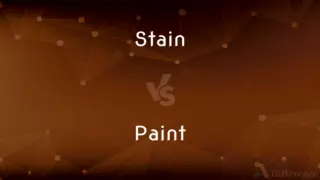Blacksmith vs. Ironmonger — What's the Difference?
By Tayyaba Rehman & Maham Liaqat — Updated on April 25, 2024
Blacksmiths craft objects from iron by heating and forging, while ironmongers sell iron goods and hardware.

Difference Between Blacksmith and Ironmonger
Table of Contents
ADVERTISEMENT
Key Differences
Blacksmiths primarily focus on the art of forging and shaping iron and steel through heating and hammering to create objects ranging from tools to artistic sculptures. On the other hand, ironmongers deal primarily in the retail aspect, selling various iron products and hardware, often including those made by blacksmiths.
Blacksmithing involves a hands-on, creative process where the smith physically manipulates metal into desired shapes. Whereas ironmongers engage in a commercial process, managing inventory and providing customer service without participating in the manufacturing of the items.
Blacksmiths typically work in a forge or workshop, using tools like anvils, hammers, and tongs to craft metal. In contrast, ironmongers operate out of stores or warehouses where they manage and sell stock.
The skill set required for blacksmithing includes a deep understanding of metallurgy and craftsmanship, requiring years of training and practice. Conversely, ironmongering requires knowledge of product types, uses, and business acumen to effectively run a store.
Blacksmiths often produce bespoke, customized items tailored to specific customer needs, emphasizing artistic craftsmanship. Meanwhile, ironmongers provide a range of pre-made products catering to broader consumer needs, focusing on distribution and sales.
ADVERTISEMENT
Compare with Definitions
Blacksmith
A craftsman who creates objects from iron or steel by forging the metal.
A blacksmith hammered the hot iron on an anvil to shape it into a horseshoe.
Ironmonger
A retailer specializing in the sale of iron goods and hardware.
The ironmonger stocked everything from nails to large tools.
Blacksmith
A professional skilled in the art of blacksmithing, focusing on metallurgy and thermal dynamics.
He apprenticed under a master blacksmith to learn the traditional techniques.
Ironmonger
A dealer in various metal products used in construction and repairs.
Contractors often visit the ironmonger for supplies.
Blacksmith
Someone who operates a forge and uses tools like hammers and anvils.
The village blacksmith repaired tools and crafted new farm equipment.
Ironmonger
A business person knowledgeable about metal properties and applications.
The ironmonger advised on the best type of screws for outdoor use.
Blacksmith
A creator of both functional and artistic metal works.
The blacksmith exhibited his ornate gates at the local gallery.
Ironmonger
A supplier of metal items essential for building and maintenance tasks.
Our new kitchen fittings were sourced from a local ironmonger.
Blacksmith
An individual offering customized metal solutions.
She consulted with a blacksmith to design a bespoke wrought-iron railing.
Ironmonger
A provider of both industrial and household metal goods.
She found the perfect iron decorations at the neighborhood ironmonger.
Blacksmith
A blacksmith is a metalsmith who creates objects primarily from wrought iron or steel, but sometimes from other metals, by forging the metal, using tools to hammer, bend, and cut (cf. tinsmith).
Ironmonger
A hardware merchant.
Blacksmith
One that forges and shapes iron with an anvil and hammer.
Ironmonger
A retailer in iron goods and hardware.
Blacksmith
One that makes, repairs, and fits horseshoes.
Ironmonger
A dealer in iron or hardware.
Blacksmith
A person who forges iron.
Ironmonger
Someone who sells hardware;
In England they call a hardwareman an ironmonger
Blacksmith
(informal) A person who shoes horses.
Blacksmith
A blackish fish of the Pacific coast (Chromis punctipinnis).
Blacksmith
(intransitive) To work as a blacksmith.
Blacksmith
A smith who works in iron with a forge, and makes iron utensils, horseshoes, etc.
The blacksmith may forge what he pleases.
Blacksmith
A fish of the Pacific coast (Chromis punctipinnis, or Heliastes punctipinnis), of a blackish color.
Blacksmith
A smith who forges and shapes iron with a hammer and anvil
Common Curiosities
What does an ironmonger do?
An ironmonger sells iron goods and other related hardware, typically in a retail setting.
Are blacksmithing and ironmongering competitive fields?
Blacksmithing is more niche with fewer practitioners focused on craftsmanship, whereas ironmongering is broader with competition in retail markets.
Can a blacksmith be an ironmonger as well?
Yes, some blacksmiths expand their services to sell metal goods, effectively acting as ironmongers.
Is there a modern demand for blacksmith products?
Yes, there is a demand for custom, handcrafted metal items in decorative and architectural applications.
What does a blacksmith do?
A blacksmith forges and shapes metal, primarily iron, into various objects using tools like hammers and anvils.
What is the historical significance of blacksmithing?
Historically, blacksmiths were integral to communities for making and repairing tools, weapons, and household items.
What tools are essential for a blacksmith?
Essential tools include a forge, anvil, tongs, and hammers.
What are common products made by a blacksmith?
Common products include tools, architectural features, decorative items, and custom sculptures.
Where do ironmongers get their products?
Ironmongers typically source their products from various manufacturers, including blacksmiths.
How do blacksmiths learn their trade?
Many blacksmiths apprentice under experienced practitioners or attend schools specializing in metalwork.
How has the role of the ironmonger evolved with modern retail?
Ironmongers now often include online sales platforms to reach a broader market.
What kind of customer base does an ironmonger have?
Ironmongers cater to both professionals in construction and DIY enthusiasts.
What skills are crucial for an ironmonger?
Important skills include product knowledge, customer service, and business management.
What are the environmental considerations for both professions?
Both professions need to consider sustainable practices, especially in material sourcing and energy use in production.
Can blacksmithing be considered an art?
Yes, many blacksmiths are also artists, creating intricate designs and decorative pieces.
Share Your Discovery

Previous Comparison
Nee vs. Nep
Next Comparison
Him vs. HisAuthor Spotlight
Written by
Tayyaba RehmanTayyaba Rehman is a distinguished writer, currently serving as a primary contributor to askdifference.com. As a researcher in semantics and etymology, Tayyaba's passion for the complexity of languages and their distinctions has found a perfect home on the platform. Tayyaba delves into the intricacies of language, distinguishing between commonly confused words and phrases, thereby providing clarity for readers worldwide.
Co-written by
Maham Liaqat














































